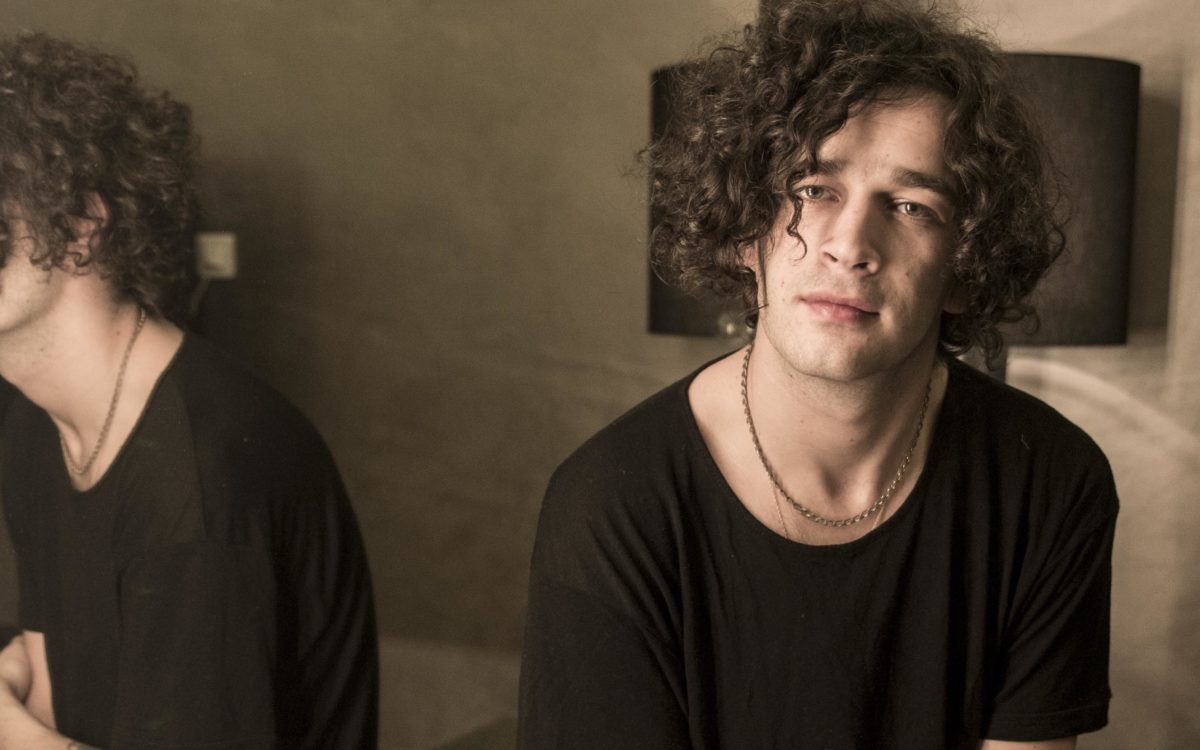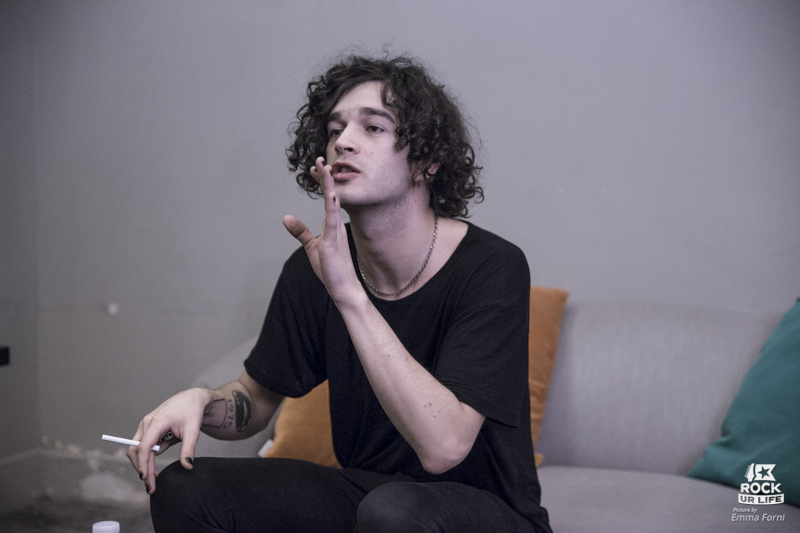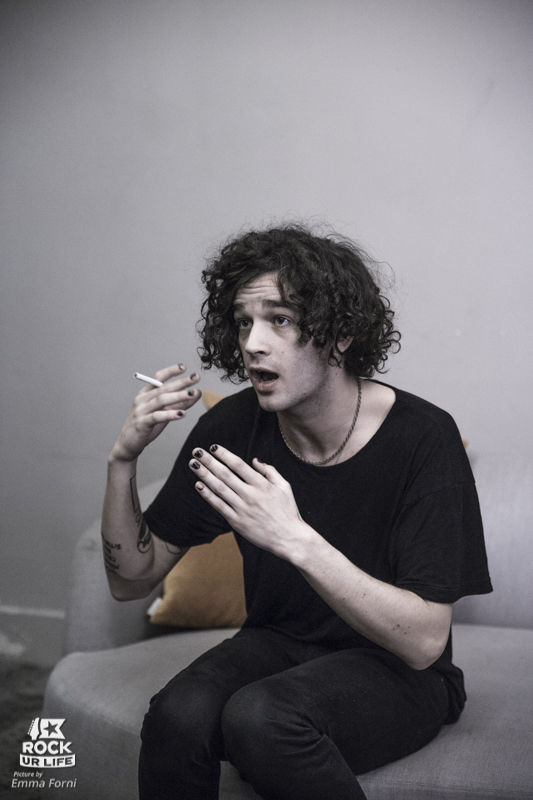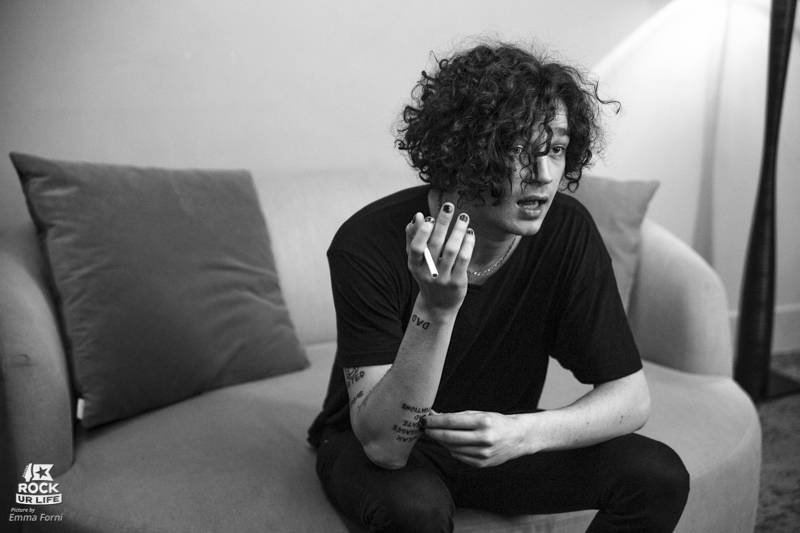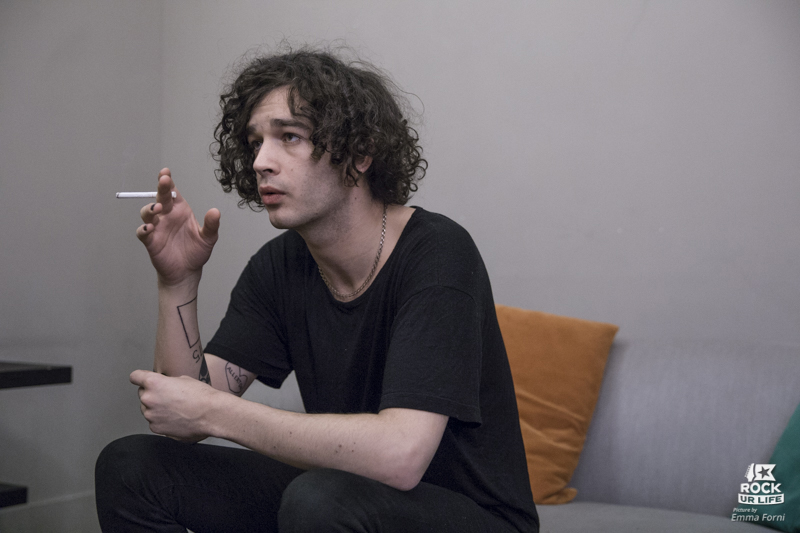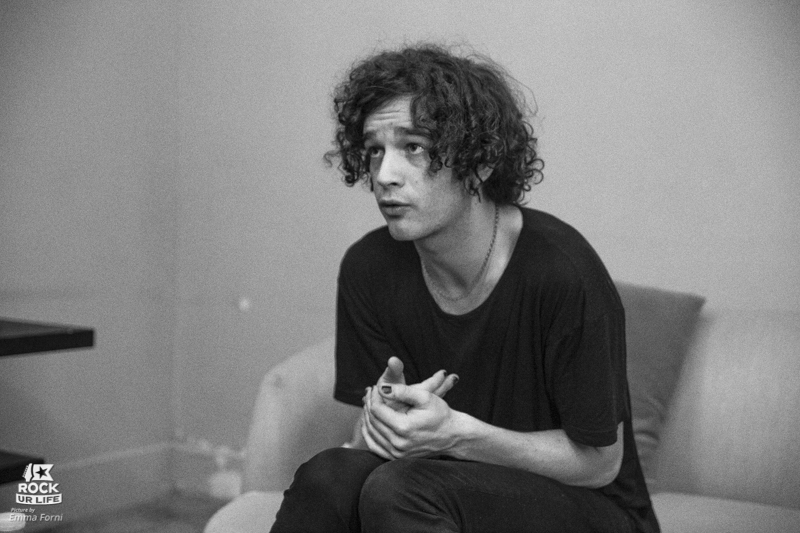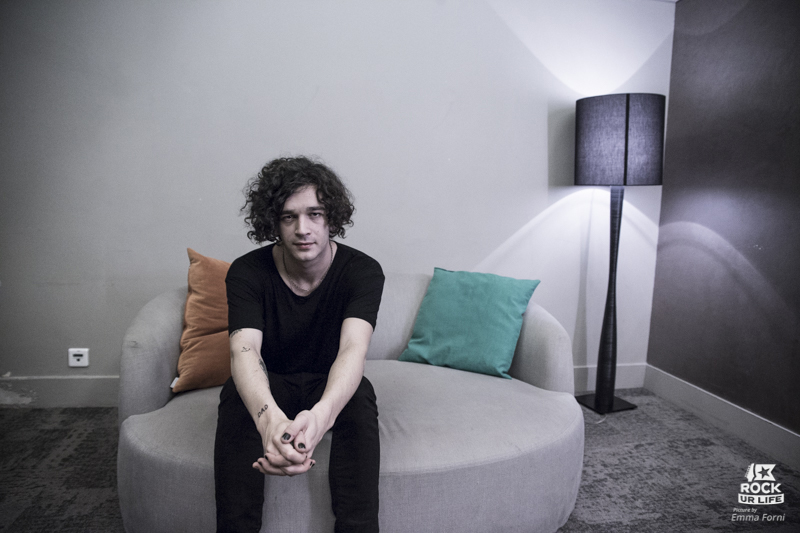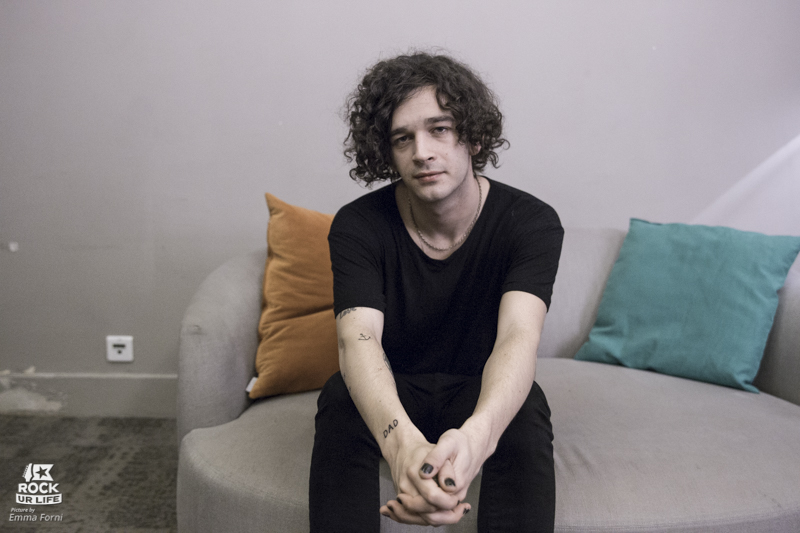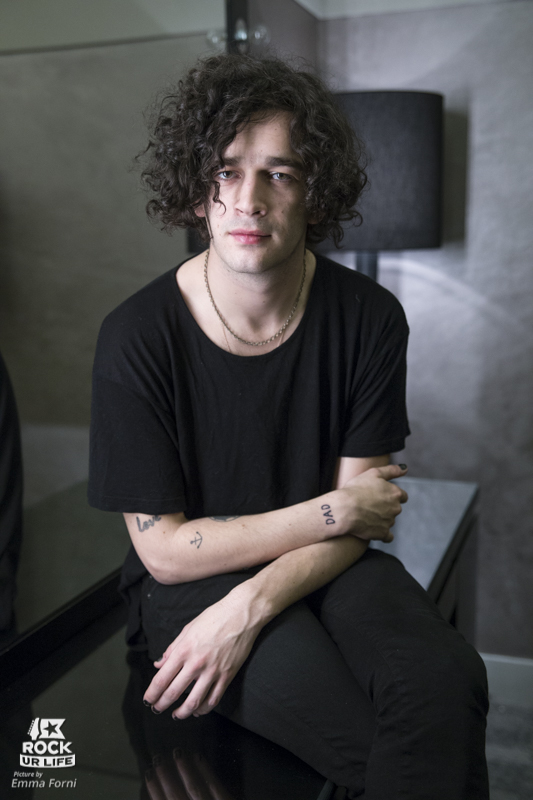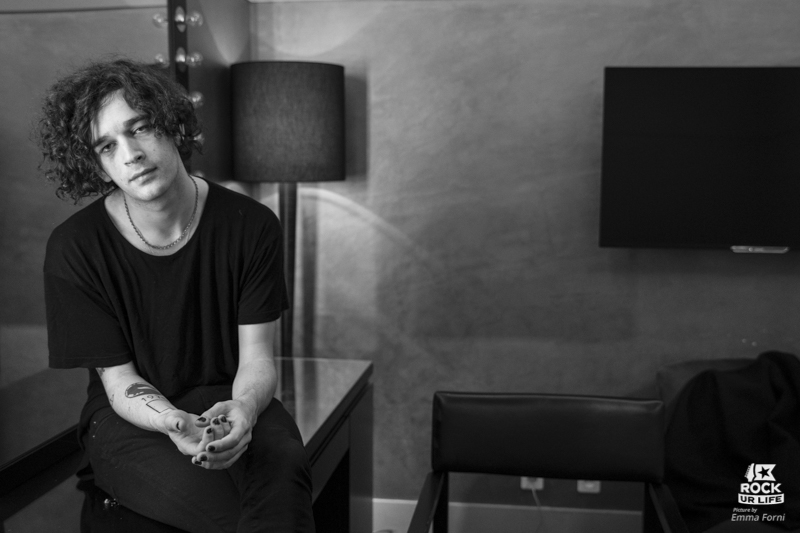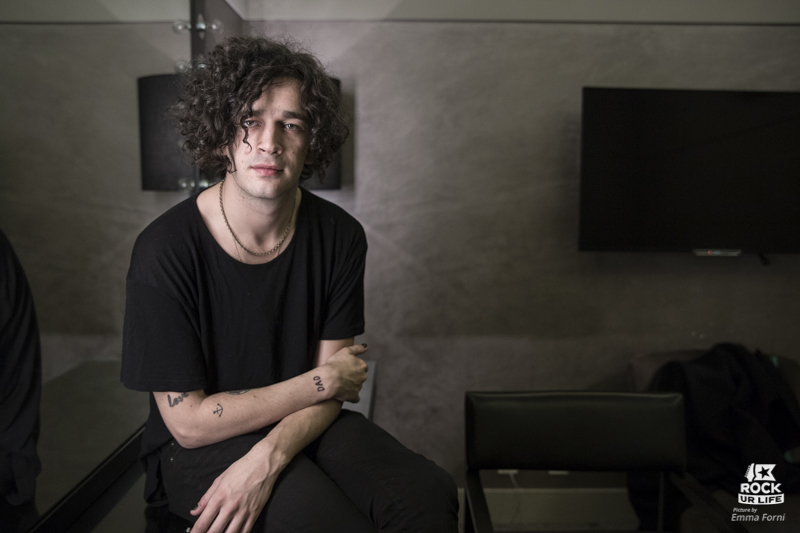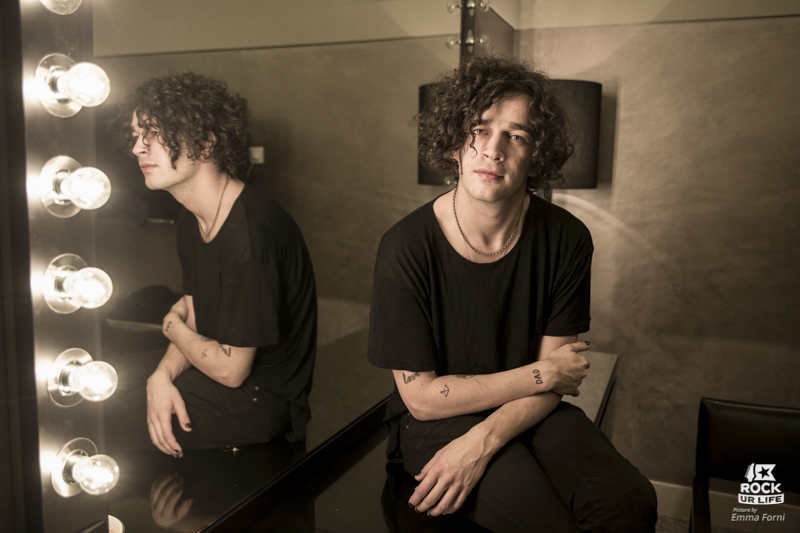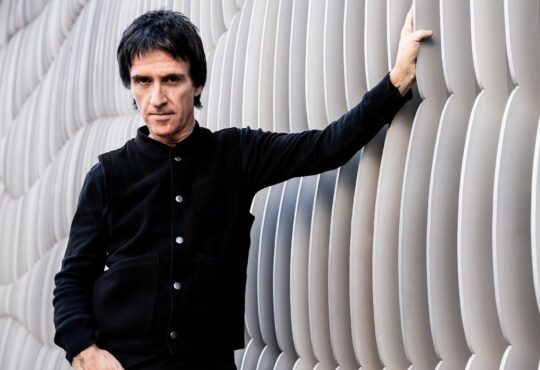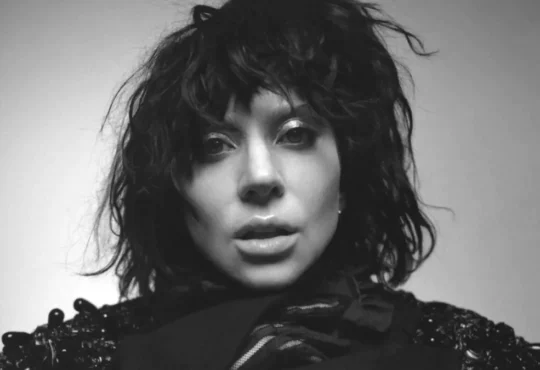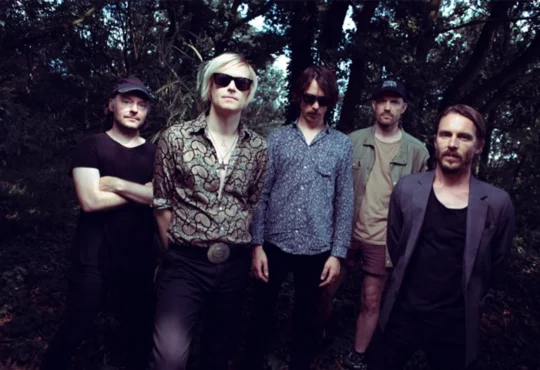Few hours before showtime, RockUrLife spoke with Matthew Healy about the new The 1975 album and life overall.
Hi Matthew, how do you feel few hours before your show at Olympia?
Matthew Healy (vocals): Hey, it feels good to be back.
The Olympia is actually the biggest venue you’ve ever played in Paris, after rocking the Maroquinerie in 2013 and twice the Trabendo in 2014. But back to the beginning of the new chapter of The 1975, you wrote to your fans your envy to play in small venues that “feel intimate enough to do a proper new show”. Without any negative thoughts from us at all, isn’t that paradoxal to see you fill in that kind of big parisian venue?
M: This place is small enough to do a proper new show. But you know what’s difficult? It’s to use the word “intimate” when you’re in the position I am in. Regardless of my ego or my beliefs or anything, we are a band of a certain size. We do sell a certain amount of tickets. So an “intimate” venue it depends of how you class it. We couldn’t go on tour in venues of 200 capacity because that’s just silly. When we toured the UK and America, considering the venues we’ve just played before, the venues were very intimate. Academy 1, for example. I mean, yes this is bigger on the intimate scale but if you can still see people’s faces, in my opinion it’s still something very intimate. That sounds like a bad quote but, trust me, I can make that room intimate. I know how to make it intimate. It’s just about how you make people feel. “Intimate” means personal.
Talking about the rebirth of your band, it seems that you really wanted to isolate both of your releases: you disappeared during a few days on the social medias last June and you also shut down your website to finally came back with a brand new identity. Why did you need to make it that way? Is your past difficult to assume or did you want both your past and your future to be preserve from one another?
M: Here, you’re talking about how to make people aware that you’re making a new record. That’s the boring way to think about it. My whole thing is I’m a strong believer in the fact that desire is way stronger than obtaining something. When you have something, you have it. You’ve got it and that’s it. My theory was “if you want to create a demand for something: remove it, don’t promote it”. So I thought if we get rid of everything, that’s how you make noise. Somebody said “there’s a now the 1975 record”, that’s ok. But imagine: “The 1975 are disappearing from the world”, that’s the thing.
So it’s more like a new promotional tool.
M: Yes. That sounds quite contrive as well, like marketing, but it was me, getting into the mood of making a new record, getting creative and being at home, bored, with my mobile phone thinking “I’m gonna delete it”. It wasn’t like a big meeting etc, I’m a person and I was just fucking around. Maybe it’s a bit mean but it’s just a thing that I did. Then everybody was like “oh my god, what’s happening?”, “what a marketing thing” but just no. I just turned it off and then I changed it to pink, which I knew that’s what we’re gonna do, and then i put it back on. After that, everybody were like “this is genius” but again no, it just turned it off.
Originally known for your black and white identity, The 1975 has now a pink image, still linked to its iconic box. Why did you pick the pink color?
M: The black and white is such a clean visual aesthetic. It gives you licence to just have a style. If you do every music video black and white, every picture black and white, it just becomes a thing. What I knew was that I wanted the next record to be an evolution but I also wanted it to stay with our identity like the box (showing with right arm with his box tattoo). So keep the form, change the style, that was my idea. And what is the opposite of black and white?
Colors.
M: And what is the most extreme color? A vibrant one? Pink. That’s the opposite. But I also studied it a lot. I’m a big fan of James Turrell (“Art is to use light”), I read a lot and then I went on the Internet, I saw all of our fans tumblr, all the color skins that they like and I saw what was happening in fashion. And this pink was starting to come true. I thought “what if we could make a color skin that is as concise as black and white”. That’s perfect. So that’s what we did and I think we’ll do it again.
So fan’s opinions matter in that equation.
M: Yes and no. When we stop toured in January 2015, everything stopped. Every day, we used to put up a different black and white picture so you went on tumblr or on a fan page, it will constantly be updated with the photo we just put up. Once we stopped doing that, there were no more material. They had no more picture so they started recoloring old pictures. I started looking at the colors and it would always be a soft pink or a soft blue or a soft green. I was really getting into the record, being self referential and writing lyrics about the first album : it just makes sense to take influence of what was already there.
Almost a month ago, you released your second studio album “I Like It When You Sleep For You Are So Beautiful Yet So Unaware Of It“. On “I Like It…”, there are a very pure essence of love, of self criticism and a pinch of story telling. What’s the concept behind this album? Do you think talking about your own life is a particularity that distinguishes your band to one another?
M: There’s no real concept behind it, it’s more like an oddity, like a big journey of ideas. We’re like bursting at the seams sonically and philosophicaly. I didn’t know what I wanted to do, I just knew that I wanted to talk about it. There are things that I care about, things that upset me and things that make me excited and I knew I wanted to talk about them. And how we spoke about them musically didn’t matter. Whatever song we heard we loved, let’s make that song. If it’s a pop song, an R’N’B song, a dance song, it doesn’t matter. If we loved that song and it inspired us, let’s remake that song. It was almost like a cover album: every song musically has a direct song that inspired it.
One of yours or one from another artist?
M: Sometimes, one of ours. Sometimes, we listen to our old material and pretend it’s from another artist and then think “how could we steal this and get away with it”. So imagine this wasn’t us, how could we’ve been inspired by this without ripping it off and getting sued.
In this case, by yourself.
M: By yourself, yes, because that’s a good way to evolve. It will sound like you but you’re not doing the same thing again. Doing your old material like a different band. And about artists that inspired us, there are too many: this will just be like a neverending list. But to say some, I will say Brian Eno, Talking Heads, INXS, Michael Jackson, but also modern bands like Sigur Ros, Jamie XX. There is no restriction, there’s no rule.
That’s maybe what everybody likes about you.
M: You and I are from the same generation. We don’t listen to one type of music because we don’t do that anymore so we represent that. People like that because we understand it and that’s why we couldn’t get sign, because all of the big major labels are run by people who are older. They don’t understand what it’s like to grow up in an environment where you could reference things of a million miles within a minute. They didn’t know what it was like having MySpace when you’re sixteen. We were like “this band’s cool, this one’s too, and this one’s too…”. That’s what being cool is. Being cool is referencing things and before, it was harder to be cool because you’ve had to had read that book or seen that french new wave movie. Now, with the Internet, you can be cool in 25 minutes. We live in a time where we represent that. We create in the way that we consume.
Like you said few years ago, your first album was a mix of all the good songs you wrote under different names. Did that force you to write new songs as good as your last ones or that idea didn’t even go through your head and this new chapter is more like a stressless and incoming adventure?
M: It doesn’t go through our head. Big songs never come through thinking “let’s write a big song”. A big song is a song of truth and belief and accidents. If there were a formula to make a big song, everybody will make a big song. We had some kind of fear to be considered as “sell out” with this new record. That’s why we called it “I Like It When You Sleep For You Are So Beautiful Yet So Unaware Of It”. Because I was scared and I didn’t know what I was doing, what people were gonna react. I thought “am I still the same person, am I gonna write about the same thing” and then we said “fuck it, stop being scared and let’s make some decisions”. And then we started talking about the album et I was like “ok, it’s called… that! (point a finger at a book)”. Now it’s already ridiculous and if we called it that, we had to make that album, a ridiculous album.
Does your way of writing change with the success of your first album ? Did you feel more confident?
M: It just makes me feel less alone. I know that sounds quite sad.
No at all. That’s real: we all are alone.
M: You get it. When I was writing that record, I felt very vulnerable, isolated, maybe misunderstood. And when you pull off all these ideas into a piece of art and you deliver it and it’s very accepted, this makes you feel accepted.
“The Sound” and its music video are two things that prove that you pay attention to critism and the hate of people. Is that difficult for you to assume your status of rockstar?
M: The concept of rockstar doesn’t really exist anymore because we’re too self aware, now it’s really easy to be connected with “rockstars”. You couldn’t even culturally get close to Michaek Jackson because if you wanted to even feel remotely connected to Michael Jackson, you would have to write a letter to a fanclub with a million other people will get sent back. Now, there’s a chance that if you had somebody on Twitter, they could reply to you. That immediatly demystifies the all thing. We don’t are celebrities in the way that we used to. People are now reachable when they used to be cultural messiah. When Michael Jackson first did the moonwalk at the Grammy’s, the world blew up, there were no criticism there. But if he did it now, the first comment will be “he’s not walking backwards”. That immediatly culturally demystifies it. So now, you can’t be a rockstar without making a joke out of it. That’s what I do. You have to be self aware, you can’t be a rockstar without saying “hey look, i’m being a rockstar”. That’s what I do and why I love The Sound’s video, because I don’t care about the criticism. That’s what it’s about. Music is about subjectivity. What do I want? Do I want to be in a band where fucking half of the people loves us so much that they sleep outside, next to beans to get into our shows whilst other people say that they want to kill us or do I want to be a band where everybody’s like “yeah they’re alright”? I don’t wanna provoke an ambivalence in people, I want to provoke something. I’ve got a tattoo, “weak messages create bad situations”, which says there’s no room for weak messages. I want strong messages and I want people to really believe in them. And they don’t believe in them, disagree with them. I don’t want people to not care.
But do you think music is the best way to respond to haters? They doesn’t even know you properly.
M: My music for me is the environment that I have to be at my smartest. Me arguying with somebody or going on a Twitter run or saying something in an interview, I’m never gonna win an argument as much as I could in the context of music. When I’m writing music, that’s when I’m on my cleverest, my wittiest, my most self aware. That’s what i’m talented at.
In a recent “Rolling Stone” interview, you said that touring nonstop for three years was more difficult than they thought it would be. Regarding the success of “I Like It”, how do you manage to face again this touring experience?
M: I’ve done it now so I’ve learned what to do and what not do to. It’s like your first year of job, you fucked up lots and then you get it. You live and you learn. Don’t do too many drugs, Don’t try having a really really long distance relationship. You can do but don’t do the things that fucked you up the first time. It’s quite simple and now it’s my job and I know how to deal with it. How do you deal with being a fireman? (laughs) First you go on the burning place andyou think “fuck it, I don’t wanna do that” but then you think “OK don’t go to that burning room” and everything is OK. I’m a professional now. I do this now.
It’s your job, your reason to wake up every morning.
M: Yeah but I won’t say “job” because that’s trivialised it. Sometimes this word forgets passion and love. And in my case, I love it.
Talking about love, there’s a song called “Paris” and well, we’re in Paris, so what’s the story behind this?
M: Paris obviously is a romantic place. This is the city of love culturally. This song is about a girlfriend. We’ve never really been to Paris and we always said that we would going to. And this trip to Paris that never happened stood for the salvation of our relationship. The lyrics “how I’d love to go in Paris again” is how i love to go back to that place where we were. Paris represents the place where it feels good and infortunately, we’ve never got there.
But as there are a lot of other beautiful places in the world, this song could have been named “London”, “Venice”.
M: Of course, but look (sings) “how I’d love to go to London again”. It’s not that good. (laughs)
Finally, our website is called “RockUrLife”, so our final question is : what rocks your life, Matthew?
M: I don’t really do drugs in the way that I used to so not drugs anymore. I’m a bit more bored by them. I play shows every night, that’s what rocks my life. What else could you do instead of actual rock n’roll every day that can rock your life more than that? Also, touring the world with your best friends, getting pissed. That’s what rock my life. The 1975 is my catharsis, my social group, my outlet, my day to day, my cultural references, my job, my purpose. Sometimes when you go out and you played for 10 000 people and then go to your hotel room, it feels like “fuck I’m alone”. But that doesn’t last very long. I’ve got a little dog at home, my best friend who also lives with me, Sam, who does all of our artworks. James lives 35 seconds across the street. I don’t leave The 1975, I’m fine.
Website: the1975.com



